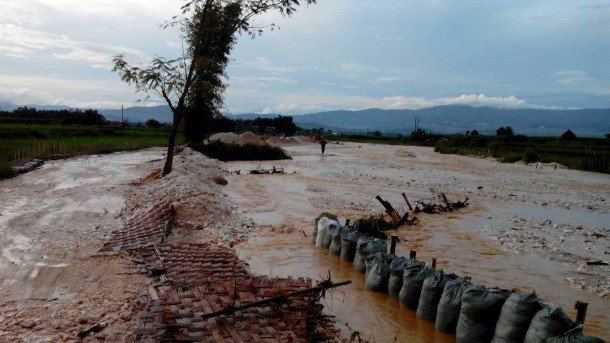Community groups in northern Shan State are calling for mining operations in the area to be halted because they are wrecking the environment and damaging farmland in Namkham.
In a joint statement issued Monday, 10 Shan community-based organizations said mining for silica—a mineral extracted from sand—should not take place until mining practices are reformed and peace prevails in the area, which sees frequent clashes between the Burma Army and ethnic rebels.
“The [silica] mining has led to floods, damaging more than 100 acres of nearby land and crops there,” activist Nang Muay Noom Hom told The Irrawaddy.
“Roads were also damaged by the floods and there have been fatal road accidents.”
More than 3,000 people demonstrated in Namkham on Sept. 5 to demand that mining stops immediately.
In August 2013, more than 5,900 Namhkam locals signed a petition against mining and sent it to Naypyidaw, receiving no response so far.
Six mining companies started to operate silica mines in Namhkam in 2012, exporting the mineral across the nearby border with China’s Yunnan Province, said Nang Muay Noom Hom.
“For more than two years, silica has been exported to China day and night in 10-wheeled trucks,” she said.
The joint statement quoted locals as saying that Nam Thiri Creek, on which nine local villages rely for water, had become blocked up with sand from the mines, and the resultant flood has damaged nearby farmland, crops and dams.
GSM Co., which is reportedly linked to former Burmese Industry Minister Aung Thaung, was the first company to mine silica in Namhkam, according to the Shan groups.
The statement also said that companies Myanmar Mya Oo Co.—linked to Pansay militia leader and ruling party lawmaker Kyaw Myint—New Kabar Kyaw Co. and Pan Thitsar Co. are also operating silica mines.
Silica is a chemical compound that exists naturally as sand, quartz and flint and is used in soaps, cosmetics and other skincare products.
The ethnic Palaung armed group the Ta-ang National Liberation Army, as well as the Kachin Independence Army and the Shan State Army-North are all active in the area around Namkham.
“Ceasefire talks are going on, but the process is still not promising,” said Nang Muay Noom Hom.
“The international community says reforms are really taking place in Burma. In fact, they have yet to reach the people.”

















